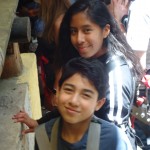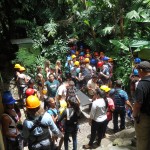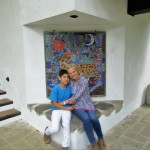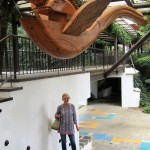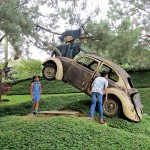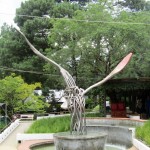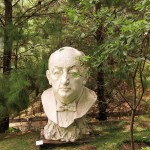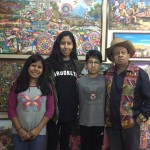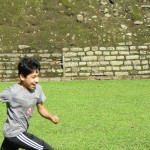Last week, Olivia said, “Are you going to post one of those photos of me with ‘Ana’ from the back?” A picture from our annual visit with Olivia’s birth mother, and one of Mateo with Olivia’s Abuela. I love that we all meld together into one family.
Butterfly house and zipline
August 7th, 2017In Panajachel, Guatemala, we visited the Lake Atitlan Butterfly Reserve. The kids zip-lined while I remained (happily) earth-bound.
Trip to El Tenador
August 6th, 2017I wrote this a few weeks ago, when we were in Guatemala:
We caught the shuttle from Casa Santo Domingo to the restaurant on the hill, El Tenador. (the Fork.) Admired the Quetzal and VW sculptures of Efrain Recinos and the Jaguar mosaic of Roberto Gonzalez Goyri. Toured museums dedicated to Guatemala’s 1967 Nobel Laureate for Literature, Miguel Angel Asturias, and Pope John Paul II, also ran around the grounds and aviary. The view from the restaurant is spectacular. We recommend the tacos. (Today was our third visit. We love this place.) (They also have a zipline: Not as dramatic as in Panajachel, a bit pricey, fun.)
Trip to Comalapa and fireworks on the calle
August 6th, 2017We made our annual pilgrimage to the Comalapa studio of painter Oscar Peren, visited the ruins at Iximche, and ate hand-made tortillas at Chichoy. One night in Antigua, we heard fireworks that sounded as close as our front door and when we ran outside, discovered they were. We’re home in California now, but Guatemala still feels close.
Ruth Sheehan of the Guatemala 900
August 6th, 2017Over the years, I’ve posted many times about the waiting families of the Guatemala900, whose cases were stalled when adoptions between the US and Guatemala stopped in December 2007. Ruth Sheehan’s son, “Paco,” was two months old when she filed her first adoption document in 2007. Paco is now ten, and his adoption still isn’t final. I rarely share fundraising pleas–there are so many worthy causes!–but this one feels close to my heart. I’m sure any amount will help.
Even if you can’t donate, please read Ruth’s story to understand her struggle and dedication. If you’re a person who prays, please pray for continued strength for Ruth and her son. If you’re a person who sends positive thoughts, please send those, too.
Pamela Yates in the Washington Post
July 19th, 2017In this Washington Post interview, “From Civil War to Civil Protest: A Director Looks Back on Three Decades of Filming Guatemala,” Pamela Yates discusses 500 Years, the third film in her trilogy of When the Mountains Tremble and Granito. I haven’t yet seen 500 Years, but When the Mountains Tremble is extraordinary. Released in 1983, it’s narrated by a young Rigoberta Menchu, whose voice–both literal and figurative–is mesmerizing. It’s fascinating to read this interview and hear Pamela Yates discuss her challenges in making Mountains Tremble, as well reflect on her current work and long-term commitment to Guatemala. What an accomplishment! ~
“Finding Oscar” on Amazon
July 16th, 2017Last night, my 12-year-old son Mateo and I downloaded Finding Oscar from Amazon and watched in Antigua, Guatemala. An important, moving documentary about the 1982 massacre in Dos Erres, with period footage featuring Ronald Reagan and Efrain Rios Montt, and contemporary interviews with investigators, prosecutors, and relatives of victims.
By recounting the search for the then three-year-old boy who survived Dos Erres, Finding Oscar clearly lays out the complicated backstory of Guatemala’s 36-year armed conflict. At the end of the film, my 12-year-old son said: “Now I understand more about the history of Guatemala and the United States.”
Trigger warning: The film documents exhumation of bodies, violence, and loss.
New Yorker response
July 14th, 2017I’m almost finished my second residency of my low-residency MFA at Antioch LA and I miss my family. Maybe that’s why I was so disturbed by Sarah Hutto’s New Yorker column, “Writers Looking for Forever Families: Adoption Listings.” The column is supposed to be funny. But in my world, adoption is never a joke. I wrote a Letter to the Editor. We’ll see if they publish it:
To the Editor:
Sarah Hutto’s “Writers Looking for Forever Homes: Adoption Listings” reveals a lack of sensitivity so deep it left me shaking.
At its core, “adoption” means losing one’s parents, being separated from ancestry and blood. There is nothing funny about that. In addition, Hutto describes her characters as stereotypical losers–feral writer, smoker, bad eater, a man who bites. Substitute any other group for “people who are adopted” and listen to how the previous sentence reads.
The New Yorker owes an apology for this insulting column to every adopted baby, child, adult; every mother who made the decision to place a child for adoption; to adoptive parents.
Sincerely,
Jessica O’Dwyer
Call it for what it is
June 23rd, 2017I’m almost finished my second residency of my low-residency MFA at Antioch LA and I miss my family. Maybe that’s why I was so disturbed by Sarah Hutto’s New Yorker column, “Writers Looking for Forever Families: Adoption Listings.” The column is supposed to be funny. But in my world, adoption is never a joke. I wrote a Letter to the Editor. We’ll see if they publish it:
To the Editor:
Sarah Hutto’s “Writers Looking for Forever Homes: Adoption Listings” reveals a lack of sensitivity so deep it left me shaking.
At its core, “adoption” means losing one’s parents, being separated from ancestry and blood. There is nothing funny about that. In addition, Hutto describes her characters as stereotypical losers–feral writer, smoker, bad eater, a man who bites. Substitute any other group for “people who are adopted” and listen to how the previous sentence reads.
The New Yorker owes an apology for this insulting column to every adopted baby, child, adult; every mother who made the decision to place a child for adoption; to adoptive parents.
Sincerely,
Jessica O’Dwyer
Low-residency residency
June 21st, 2017I’m in LA, midway through the second residency (of four) of my low-residency Antioch MFA program. After this residency ends, I enter the second project period, when I must begin to write the required “Critical Paper.” No surprise that my subject will somehow center around literature and adoption. My ideas are still percolating, but I’m intrigued by the theme of “Adoption as metaphor versus Adoption as an experience that is literal.” (Speaking only for myself and my family.)
I’m also interested in this question: How has thinking around adoption evolved over time, and is that evolution reflected in its depiction in books, film, story, dialogue, online content?
Here are a few new books I plan to read:
Lucky Boy by Shanthi Sekaran (a boy born in California to an undocumented immigrant from Mexico is adopted by an Indian-American couple).
Everybody’s Son by Thrity Umigar (a 10-year-old boy in the American foster care system is adopted by a privileged couple whose son died).
What Was Mine by Helen Klein Ross (a woman snatches a baby girl from a shopping cart and raises her as her “own” for 20 years before the grown daughter discovers the truth of her origins)
Will let you know how they are when I finish. ~
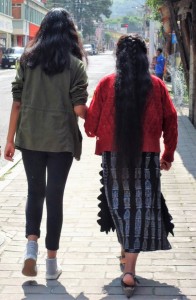
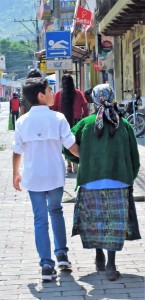



 ShareThis
ShareThis
